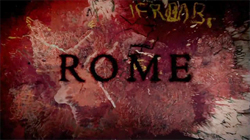This review has been a long time coming. Ever since my good friend Peter introduced it to me sophomore year of college, I have loved HBO’s miniseries Rome. This is far from an original take. Even though it was cancelled after only two seasons (mainly due to budgetary concerns), Rome is almost universally beloved by its viewers. While most praise its acting and compelling character drama, and I cannot help but agree, I love it for an additional, different reason: its unique, personal approach to the city of Rome and its inhabitants.
The vast majority of media that take the ancient world as their subject, particularly when Rome is involved, are military affairs. There’s a reason why the genre is called ‘swords and sandals,’ not ‘cement and aqueducts.’ This leads to actual daily life in the ancient world being rarely represented on screen, and when cities do appear, they are almost uniformly the clean, cold, monumentalized edifices of modern Western mythmaking. In one extreme example, the exterior shots of the city of Rome used in Gladiator were produced using a model created under Mussolini! Rome takes the opposite approach. It is not yet the city of marble that Augustus left it; the Eternal City is made of brick and crumbling cement, its alleyways and tenements vibrantly lived-in. Plebeians in rough tunics are just as common a sight as patricians in togas, and both seem to give lie to the idea of Rome as some sort of Western utopia. You can almost smell the sweat, blood, and olive oil that runs through the gutters.
This personal view of Rome is also undeniably, gratifyingly, strange. The role of Rome, and to a lesser extent Greece, as forebear of the modern Western world often leads to its depictions as close to our own modernity. But for their clothes and technology, they could be our brothers and sisters. While in some ways Rome is remarkably similar to our time, in many others it decidedly wasn’t. From priestesses showered in the blood of dying bulls to the practical, mundane role of a multitude of gods in daily life to jangly, plucky music that falls harshly on the ear, Rome steers into those points of mundane departure from modern expectations. While we may sympathize with the motivations and struggles of its characters, the world they navigate is very obviously not our own.
Both despite and because of its strangeness, then, I cannot recommend Rome highly enough, both for fans of drama and students of any era of history. You will be hard pressed to find anything that surpasses it in gorgeous sets, production value, or sheer scope of storytelling. While it can certainly be unsettling, and is not what I would call an easy binge, it is well worth it.
